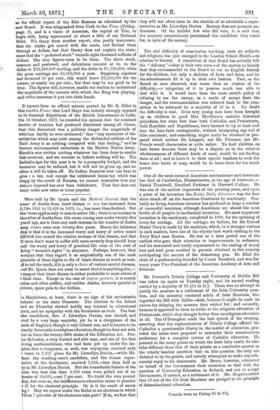1 n Marylebone, at least, there is no sign of
the enthusiastic ularist or the stern Dissenter. The election to the School lard on Thursday showed hardly any interest in educational itics, and no sympathy with the Secularists as such. The best othe candidates, Rev. J. Llewellyn Davies, was elected, and .cted by a very large majority, yet he is a clergyman of the inch of England, though a very Liberal one, and is known to be dnctly favourable to religious education, though he does not wish ut in force the twenty-fifth clause of the Education Act. Pro- or Sylvester, a very learned and able man, and one of the first tying mathematicians, who had been put up under the ins- pion that a clergyman, as such, was unpopular, received only 4 votes to 2,251 given for Mr. Llewellyn Davies,—while Mr. liner, the working-man's candidate, and the chosen repre- ative of the Secularists, received 1,038,—less than half as y as Mr. Llewellyn Davies. But the remarkable feature of the '
on was that less than 4,000 votes were polled out of an rate of 58,000,—not 7 per cent. No doubt the rain poured ay, but even so, the indifference to education seems to promise ill for the electoral principle. Or is it the result of secret g? May we expect under the Ballot to see elections in which than 7 percent. of the electorate take part? If so, we fear that
they will not of ten issue in the election of so admirable a repre- sentative as Mr. Llewellyn Davies. Secrecy does not promote en- thusiasm. Of the faithful few who did vote, it is said that the majority ostentatiously proclaimed the candidate they voted for, in spite of the secrecy.


































 Previous page
Previous page